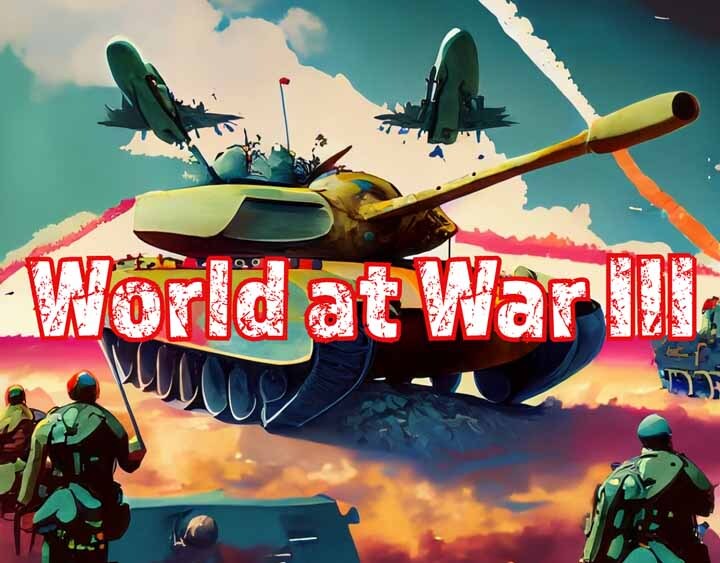 News Staff
News Staff![]() -
November 7, 2023 -
World at War -
Gaza
USA
Ukraine
North Korea
Taiwan
Ukraine Russia
World At War III
-
3.4K views -
0 Comments -
0 Likes -
0 Reviews
-
November 7, 2023 -
World at War -
Gaza
USA
Ukraine
North Korea
Taiwan
Ukraine Russia
World At War III
-
3.4K views -
0 Comments -
0 Likes -
0 Reviews

DLNews World At War:
It is alarming that the world is on the brink of a third world war, with countries investing billions of dollars and euros in the procurement of weapons. Even more concerning is the US Congress sponsors all the warring factions, making it the most significant money-making venture imaginable. The more destruction occurs, the more weapons and everyday items like toilet paper and coffeepots can be sold. This results in people working more, paying more taxes, and more money flowing in for those involved in the business.

The biggest money maker of them all!
The situation in the Middle East seems tense, with a potential military conflict between Israel and Iran over the latter's nuclear program and support for militant groups. In recent times, the world has seen the devastating impact of civil wars in Ukraine and Gaza, with limited humanitarian assistance and resources under immense pressure. Additionally, armed gangs have taken control of distribution routes, making it hard for families to access necessities. This trend is expected to persist till 2023.
China's aggressive behavior towards Taiwan is also a matter of concern. Beijing is using unconventional weapons and economic coercion to intimidate Taiwan and exert political control over it. While a full-scale invasion is unlikely, China's actions cause worry. To mitigate this, strategic deterrence should be implemented with democratic nations and high-level assurances that the United States will adhere to its one-China policy while safeguarding Taiwanese democracy.
The conflict between Ukraine and Russia has escalated, and the Kremlin's use of unconventional weapons like cyberattacks and covert intelligence operations is unacceptable. In response, NATO allies in Europe have imposed retaliatory measures, including an outright ban on Russian oil and gas imports. These measures aim to communicate that such actions will not be tolerated.
The escalation of this conflict is a grave threat to Europe and beyond, and Western states must take action to deter further aggression by Russia. Putin's desire to retain Crimea and other territory gained through invasion is unacceptable, and any attempts to expand his influence must be met with swift and costly retaliation.
It is crucial that the deterrent offered by Western states is credible and robust to ensure that Russia understands the consequences of any further aggression. We must stand firm in defending our allies and protecting our regional interests.
It is imperative to note that 2023 will witness a drastic increase in cyberattacks on critical infrastructure in the U.S. Essential systems such as power plants, water systems, and gas pipelines will be at high risk of infiltration, resulting in catastrophic consequences.
Nation-state hackers will be more aggressive this year, primarily targeting industrial control systems to steal intellectual property assets and intelligence. Thus, companies must be prepared to defend against these attacks and incur higher costs related to incident response.
The impact of an attack on a car manufacturing plant could be catastrophic. It could destroy thousands of vehicles, eventually leading to production delays of days or even weeks, with billions of dollars lost. Worst still, such an attack could even result in the loss of lives. Therefore, taking necessary measures to protect our infrastructure from these attacks is crucial.
Russia is currently experiencing growing civil unrest due to various factors. The country's use of unconventional weapons in Ukraine has caused deep divisions within Russian society and exposed vulnerable points in the global economy. This includes potential vaccine shortages for the COVID-19 vaccine and increasing food prices that threaten supply chains.
The civil discontent in Russia primarily stems from economic frustration related to elite self-enrichment during declining living standards. This has led to demonstrations following Putin's ban on independent candidates from running in Moscow city elections.
Oleg Kozlovsky, the winner of an Ion Ratiu Democracy Award, is leading an advocacy movement called Oborona that uses nonviolent methods to challenge the Kremlin. Even seemingly mundane issues, such as landfill construction in Khabarovsk, have galvanized civic protests.
North Korea's development and testing of nuclear weapons and long-range ballistic missiles
North Korea conducted its latest nuclear test at Punggye-ri. It reported producing an atomic bomb with an estimated yield of 100-370 kilotons, capable of being fitted onto long-range missiles capable of targeting targets within the United States.
North Korea recently conducted tests of a missile with solid fuel that can be launched more rapidly, potentially reaching Tokyo and other major Japanese cities, heightening regional tensions further.
The Democratic Republic of the Congo remains beset by inter-communal violence, military offensives, and a severe humanitarian crisis characterized by mass displacements, food shortages, and an ever-widening humanitarian emergency exacerbated by COVID-19, cholera, measles, and other health crises.
Since 1996, nearly six million people have died in eastern DRC following the Rwandan genocide and its subsequent intervention by Paul Kagame's Rwanda Patriotic Front (RPF) into what was then Zaire (now the Republic of the Congo). This intervention caused wars involving multiple nations and multiple armed groups.

Desert Local News is an invitation-only, members-based publication built on fact-checked, non-biased journalism.
All articles are publicly visible and free to read, but participation is reserved for members—comments and discussion require an invitation to join.
We cover local, state, and world news with clarity and context, free from political agendas, outrage, or misinformation.